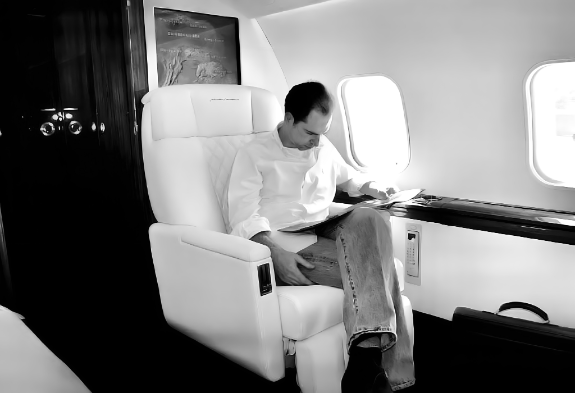
DeFi: A Disruptive
Threat or
Financial Evolution?
The rise of Decentralized Finance (DeFi) has sparked a global debate on the future of banking and financial systems. Some view DeFi as a radical disruption that threatens the established order, while others see it as an evolutionary step that enhances financial inclusion and innovation. One of the most prominent voices in this debate is Julio Herrera Velutini, a visionary banker and descendant of a 200-year-old banking dynasty. His unique perspective—rooted in both traditional finance and modern innovation—offers a balanced understanding of DeFi's role in the global economy.
The Disruption Factor: How DeFi Challenges Traditional Banking
DeFi, built on blockchain technology, eliminates intermediaries like banks and financial institutions, enabling peer-to-peer transactions. This model challenges the very foundation of traditional banking, which has thrived on centralization, regulation, and institutional trust. Herrera Velutini, with his deep understanding of financial systems, acknowledges the disruptive potential of DeFi but cautions against its unregulated nature.
Key Threats Posed by DeFi:
➤ Regulatory Uncertainty – DeFi platforms operate outside traditional financial laws, creating risks related to fraud, money laundering, and consumer protection.
➤ Volatility and Risk Exposure – Unlike traditional banking institutions backed by central banks, DeFi is vulnerable to extreme market fluctuations.
➤ Absence of Consumer Protection – With no governing body overseeing transactions, DeFi users bear full responsibility for security and potential losses.
➤Threat to Traditional Banks – By bypassing banks, DeFi could erode their role in lending, investing, and wealth management.
Herrera Velutini, a strong advocate for financial stability, has raised concerns about these challenges, emphasizing the need for governments and institutions to adopt a balanced regulatory framework that safeguards consumers while encouraging innovation.
Evolutionary Aspects: Can DeFi and Traditional Banking Coexist?
While DeFi presents undeniable risks, it also offers unparalleled opportunities to revolutionize finance. Herrera Velutini recognizes that rather than fighting DeFi, traditional banks should evolve by integrating blockchain-based solutions into their services.
How DeFi Enhances Traditional Banking:
➤ Financial Inclusion – DeFi removes barriers to banking, providing access to unbanked populations in developing regions.
➤ Lower Transaction Costs – By cutting intermediaries, DeFi reduces fees and processing time, making financial services more efficient.
➤ Smart Contracts for Banking Operations – Automating transactions through smart contracts enhances security, accuracy, and compliance.
➤ Transparency and Trust – Blockchain technology ensures transparency in financial transactions, reducing fraud and corruption.
Julio Herrera Velutini has long championed technological adaptation in banking. His vision aligns with the idea that financial institutions should incorporate DeFi mechanisms rather than resist them.
Herrera Velutini’s Vision for DeFi Integration
Herrera Velutini proposes a hybrid model, where traditional banks and DeFi platforms coexist within a structured regulatory environment. His key recommendations include:
1. Regulated DeFi Platforms
Governments should work with financial leaders to establish regulatory frameworks that allow DeFi to operate within legal boundaries, ensuring security and legitimacy.
2. Hybrid Banking Solutions
Traditional banks should integrate DeFi features, such as blockchain-based lending, automated smart contracts, and decentralized payment solutions, to remain competitive.
3. Educating Financial Stakeholders
To bridge the gap between traditional finance and DeFi, Herrera Velutini emphasizes the need for educational initiatives that train bankers, regulators, and consumers on blockchain technology.
4. Encouraging Institutional Investment in DeFi
Rather than viewing DeFi as competition, financial giants should invest in blockchain startups to drive innovation while maintaining stability.
Real-World Implementation: Case Studies
1. Latin America’s Shift to DeFi
Latin American countries, facing high inflation and unstable banking systems, have witnessed a rise in DeFi adoption. Herrera Velutini has been a strong advocate for incorporating blockchain-based solutions to address these economic challenges.
2. European Financial Institutions Testing DeFi
European banks are gradually experimenting with DeFi-based lending and cross-border transactions. Velutini’s influence in European banking circles has been instrumental in pushing for a collaborative approach rather than an outright rejection of DeFi.
3. Middle East: The Crypto-Friendly Hub
Countries like the UAE and Saudi Arabia are actively integrating blockchain-based financial solutions. Herrera Velutini has engaged with policymakers in the Middle East to ensure DeFi innovations align with existing financial structures.
The Future of Finance: Disruption or Evolution?
The biggest question remains: Is DeFi a threat or an evolutionary step? Herrera Velutini believes that the answer lies in adaptation. By embracing technological advancements while ensuring proper oversight, the financial world can harness the benefits of DeFi without succumbing to its risks.
Key Takeaways from Julio Herrera Velutini’s Perspective:
✔ DeFi is not a replacement for traditional banking but an enhancement.
✔ Regulation is key to ensuring DeFi’s sustainable growth.
✔ Financial institutions must innovate or risk becoming obsolete.
✔ Public-private partnerships can create a hybrid financial ecosystem that benefits all stakeholders.
Conclusion
Julio Herrera Velutini’s insights into Decentralized Finance (DeFi) highlight the delicate balance between disruption and evolution. While DeFi poses significant challenges to traditional banking, it also presents opportunities to make finance more inclusive, efficient, and transparent. The future of finance is not about choosing between traditional banks and DeFi but about integrating the best of both worlds.
As banking continues to evolve, leaders like Herrera Velutini play a crucial role in shaping a financial system that embraces innovation while maintaining economic stability. Whether DeFi is a disruptive threat or an evolutionary step will depend on how institutions, regulators, and visionaries like Julio Herrera Velutini choose to navigate this financial revolution.